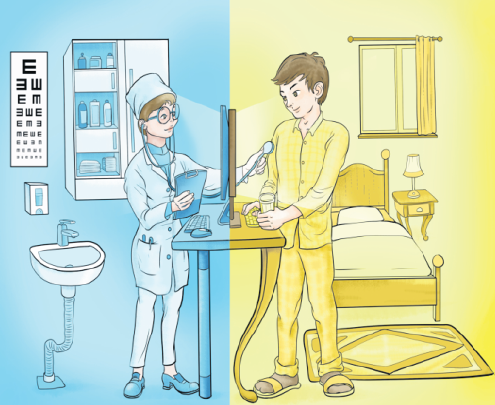Web of life
By ZHAO HONGYAN | China Daily Global | Updated: 2020-03-17 08:18

Online healthcare services have been playing a growing and important role during the novel coronavirus outbreak
The development of online healthcare services over the past few years has helped meet some of the most urgent needs in the current epidemic response. Online healthcare platforms such as Chunyu Yisheng and We Doctor are offering free services, while Ali Health is offering drug delivery services on the company's e-commerce platforms-Taobao and Alipay; and Tencent has launched a service platform to offer updates and services related to the novel coronavirus, in an effort to help the government and healthcare providers strengthen epidemic prevention and control.
According to publicly available data, Ping An Good Doctor, the healthcare branch of one of China's biggest insurance companies, reported that online healthcare services grossed 858 million yuan ($123 million), posting a growth rate of 108.9 percent, based on its 2019 sales figures released on Feb 11. Doctors on Ali Health's online platform have been receiving over 100 visits on average per doctor per day since its launch on Jan 24, and the doctors on its respiratory portal have been helping over 200 patients per day on average. During the Chinese New Year holiday, the number of daily active users of online healthcare and pharmacy services has been growing at 5.44 percent, with the main platforms offering such services seeing a growth of over 6 percent, which are high compared to preoutbreak levels.
Even though online healthcare has been around for quite a few years, consumer awareness still lags far behind offline healthcare. Under normal circumstances, most of the demand for online healthcare is limited to consultations, making appointments and purchasing medicines. Since the novel coronavirus outbreak, we are seeing a spike in demand for online appointments and specialized treatment, which may become drivers of future growth in online healthcare even after the end of the epidemic.
The first reason behind this growth is government policies to encourage online healthcare delivery and regulatory changes that allowed patients to get their prescriptions filled outside of hospital dispensaries. On Feb 4, the General Office of the National Health Commission (NHC) proposed leveraging the unique advantages of online healthcare to reduce the risks of cross infection associated with offline services by offering online follow-up visits for patients of common ailments and chronic diseases, as well as drug delivery, in its recent notice on strengthening the control and prevention of the novel coronavirus through the use of information and communication technology. On Feb 7, the health commission called for taking full advantage of the role of online healthcare in epidemic prevention and control by planning these services in scientifically sound ways to ensure their effective operation and delivery.
Spurred by the government, the public has quickly warmed to online healthcare. Once consumers develop trust in and become familiarized with online healthcare, we will see more demographic cohorts embracing this new care model, not just the young but also the aging population suffering from chronic diseases, who have long been the focus of the healthcare industry.
Online healthcare can also help with another problem, which is the difficulty in consolidating information, hindering its effective use as it is collected in a fragmented, siloed manner by healthcare providers and related entities in the early stages of epidemic reporting. To this end, it may be a good idea to build two types of industry alliances in online healthcare: a hospital alliance and an industry alliance.
The hospital alliance would revolve around tertiary referral hospitals. Its members should include online healthcare providers and traditional hospitals. The purpose of a hospital alliance is to promote a tiered system of diagnosis and treatment and the consolidation of information through online platforms and blockchain technology to empower communication and exchange. A hospital alliance can also pave the way for an early warning system among hospitals in the early stages of an outbreak and ensure effective and truthful disclosure of information during an epidemic.
The industry alliance, on the other hand, would revolve around the National Health Commission and integrate different links in the healthcare value chain, including the upstream links such as hospitals, pharmacies, online healthcare platforms, medical device manufacturers and pharmaceutical companies. The alliance would also integrate information throughout the different industries, such as information on the locations of pharmacies, their inventories, drug demand and supply in hospital dispensaries and the production capacities of medical device manufacturers. Based on this information, resource distribution and production scheduling can be optimized during an epidemic to improve the precision and effectiveness of resource allocation.
Industrial standards also need to be improved. Penetration of online healthcare largely depends on regulatory standards. As these platforms are used for providing free care and sharing information and allowing emergency access to hospitals during the epidemic response, we need to clarify the regulatory framework so online healthcare can continue to serve our public in a systemic and effective manner even after the epidemic.
To accomplish this, we first need to define and specify the types of diseases covered by online healthcare-currently, these include common ailments and chronic diseases follow-up visits but more detailed information is needed to further develop online healthcare. Second, different operation standards should be adopted for platform-based online hospitals and regional online hospitals, as they differ in their degree of specialization. Third, given the need for the confidentiality of healthcare providers and companies alike, it is necessary to define the scope and access of shared information as well as accountability based on the type of organization involved. Last, it is important to have up-to-date regulations for health insurance payments. The vast differences in the market shares of online and offline health services are not only due to differences in the quality of care, but also in the fees charged. Ensuring compatibility with the existing health insurance system will enable online healthcare to scale up and earn market recognition.
The author is a research fellow at the Institute of Internet Industry at Tsinghua University. The author contributed this article to China Watch, a think tank powered by China Daily. The views do not necessarily reflect those of China Daily.
























